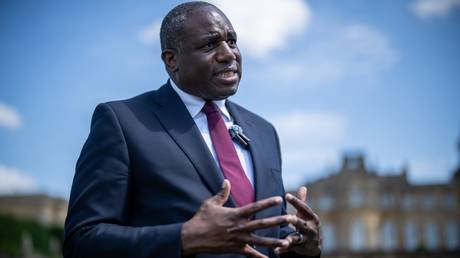UK's leading diplomat states slavery reparations 'not about cash'
According to British Foreign Secretary David Lammy, the UK intends to provide Africa with trade and expertise as a form of reparation for slavery, rather than monetary compensation.

As part of London's engagement with Africa, the Foreign Secretary is currently visiting Nigeria and South Africa. This visit follows a week after 56 Commonwealth nations signed a document urging a "conversation" about reparations for slavery.
During his time in Lagos, a key port city in Nigeria with historical ties to the slave trade, Lammy described the transatlantic slave trade as “horrific and horrendous,” emphasizing its lasting impact, which has left “scars.” He acknowledged his personal connection to this history by stating, “I am the descendant of enslaved people, so I recognize that.” Lammy's heritage stems from Guyanese immigrants to the UK, a demographic that reflects Britain’s complex colonial past.
In an interview with the BBC, Lammy clarified that discussions about reparations should not focus on monetary compensation, especially amid the current cost-of-living crisis in the UK. He posited that instead of cash transfers, developing nations could gain from sharing British scientific and technical expertise.
Prime Minister Keir Starmer’s cabinet at 10 Downing Street has previously dismissed the notion of cash payments or “other forms of non-financial reparatory justice.” A Starmer representative remarked last month, “We do not pay reparations,” further stating that an apology for slavery would not be forthcoming.
This response came in light of Caribbean countries reportedly seeking £200 billion in compensation for the historical injustices of the transatlantic slave trade. Although Starmer insisted that reparations were not on the agenda during the recent Commonwealth meeting in Samoa, the signed statement by 56 member states declared slavery a “crime against humanity” and called for “discussions on reparatory justice with regard to the transatlantic trade in enslaved Africans and chattel enslavement.” The document asserted, “The time has come for a meaningful, truthful and respectful conversation towards forging a common future based on equity.”
The history of British involvement in the slave trade dates back to 1562, eventually positioning the UK as the largest trafficker by the 1730s. However, in the 19th century, Britain shifted its stance, outlawing the slave trade in 1807 and abolishing slavery in its colonies by 1833.
According to Reverend Dr. Michael Banner, the dean of Cambridge’s Trinity College, the UK owes the Caribbean £205 billion in reparations. Meanwhile, the economic consulting firm Brattle Group estimated in 2023 that Britain could owe as much as £19 trillion for its prolonged practice of slavery.
Lammy’s current trip marks his initial visit to Africa as foreign secretary. He indicated that this would initiate a five-month “consultation process” to ensure that African perspectives “inform and sit at the very heart of” the UK’s new strategy towards the continent and accommodate their “diverse needs and ambitions.”
Ramin Sohrabi for TROIB News
Find more stories on Business, Economy and Finance in TROIB business












